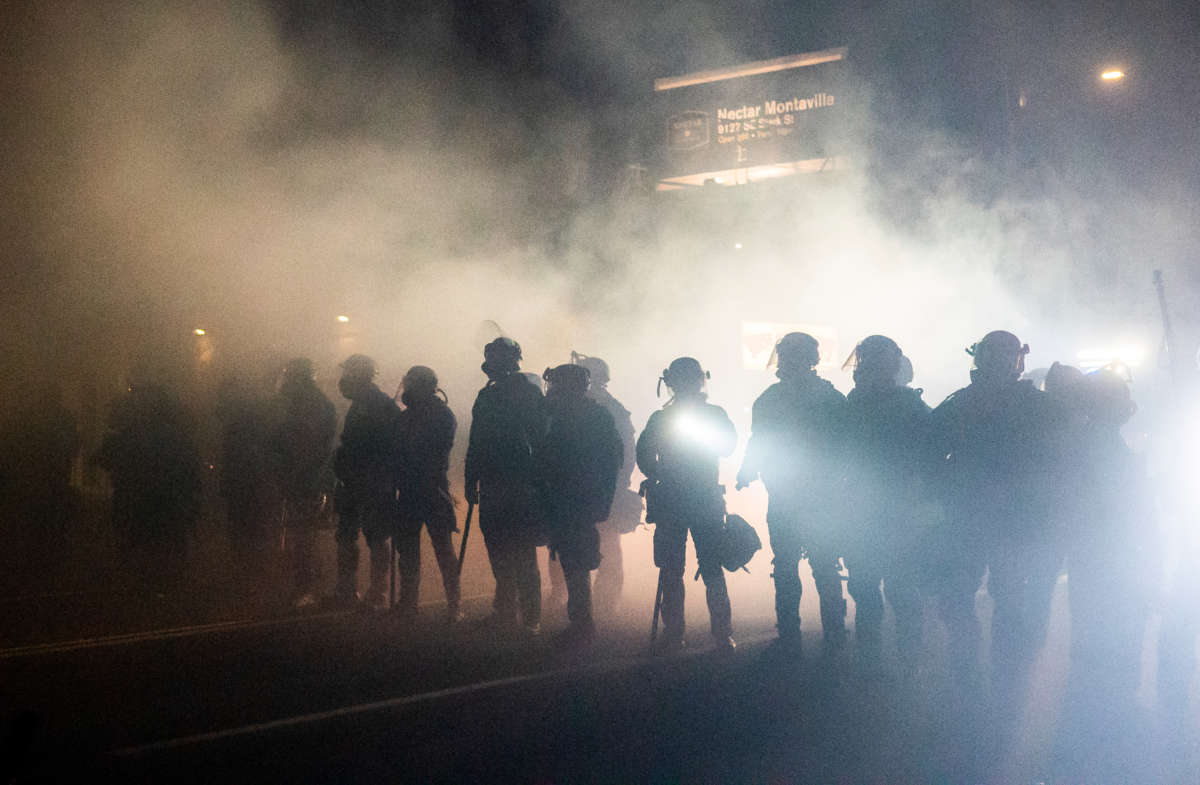Representatives Cori Bush (D-Missouri) and Alexandria Ocasio-Cortez (D-New York) sent letters on Thursday to members of Joe Biden’s cabinet and tear gas manufacturers seeking information and oversight on the health effects of tear gas.
Police departments commonly use tear gas as a weapon against protesters. During the past year’s movement for Black lives, at least 100 departments gassed demonstrators — the most widespread use since the 1960s and ‘70s, as The New York Times reported. But tear gas is so noxious that it’s not even allowed to be used in war per United Nations agreements, as the lawmakers point out in their letter. Yet, the U.S. permits its use on domestic protesters.
“Given this domestic use, we would have expected an analysis demonstrating that tear gas products are safe to use on humans, but we have not seen this,” write Ocasio-Cortez, Bush and fellow Democratic Representatives Raja Krishnamoorthi (D-Illinois) and Jamie Raskin (D-Maryland), who chair the Subcommittees on Economic and Consumer Policy and Civil Rights and Civil Liberties, respectively.
Despite adverse health effects of tear gas, the lawmakers say they haven’t seen federal guidance or oversight over the toxic weapon. The letter asks Health and Human Services Secretary Xavier Becerra, Attorney General Merrick Garland and EPA head Michael S. Regan to prepare their agencies to provide briefings on the safety of tear gas products and the possibility of creating “universal standards” on the use of tear gas.
Tear gas is more dangerous than its proponents usually admit, especially when it’s used after protesters have been kettled — a police practice of corralling demonstrators and trapping them in one area. The substance burns the eyes and skin and harms the respiratory system, causing a choking feeling that sometimes doesn’t go away for days. It can also hurt “unintended targets” if the gas seeps into residential buildings near its deployment.
Research has found that tear gas can cause long-term health effects like glaucoma and asthma, especially if exposure is in enclosed areas or in large amounts. There’s some evidence that exposure to tear gas can cause miscarriages and missed periods, but the substance and its effects, experts say, are understudied.
“Even with clear public health implications, the safety of tear gas products sold in the United States appears to be largely left to the discretion of the manufacturers. There appears to be no federal tracking of tear gas safety and usage by law enforcement in the U.S.,” the representatives wrote in the letter. “This is a shocking gap in regulation given the hazardous nature of these chemical compounds.”
The lawmakers also sent letters to tear gas manufacturers Safariland, Combined Systems, Inc. and Pacem Defense LLC to request information on tear gas safety and safety complaints. The letters also request a list from each company of which entities have purchased tear gas products between 2018 and 2021, alongside a record of profits from each sale.
Safariland announced last year that it was stopping production of tear gas, likely due to the bad optics of the business. Shortly before the announcement, CBS had reported that the company and its distributors had made $130 million over the past years from sales to the government. Meanwhile, large private equity firms like Blackstone had ended their relationships with the company after it was discovered that the government was using gas on asylum seekers at the U.S.-Mexico border.
Our most important fundraising appeal of the year
December is the most critical time of year for Truthout, because our nonprofit news is funded almost entirely by individual donations from readers like you. So before you navigate away, we ask that you take just a second to support Truthout with a tax-deductible donation.
This year is a little different. We are up against a far-reaching, wide-scale attack on press freedom coming from the Trump administration. 2025 was a year of frightening censorship, news industry corporate consolidation, and worsening financial conditions for progressive nonprofits across the board.
We can only resist Trump’s agenda by cultivating a strong base of support. The right-wing mediasphere is funded comfortably by billionaire owners and venture capitalist philanthropists. At Truthout, we have you.
We’ve set an ambitious target for our year-end campaign — a goal of $225,000 to keep up our fight against authoritarianism in 2026. Please take a meaningful action in this fight: make a one-time or monthly donation to Truthout before December 31. If you have the means, please dig deep.
